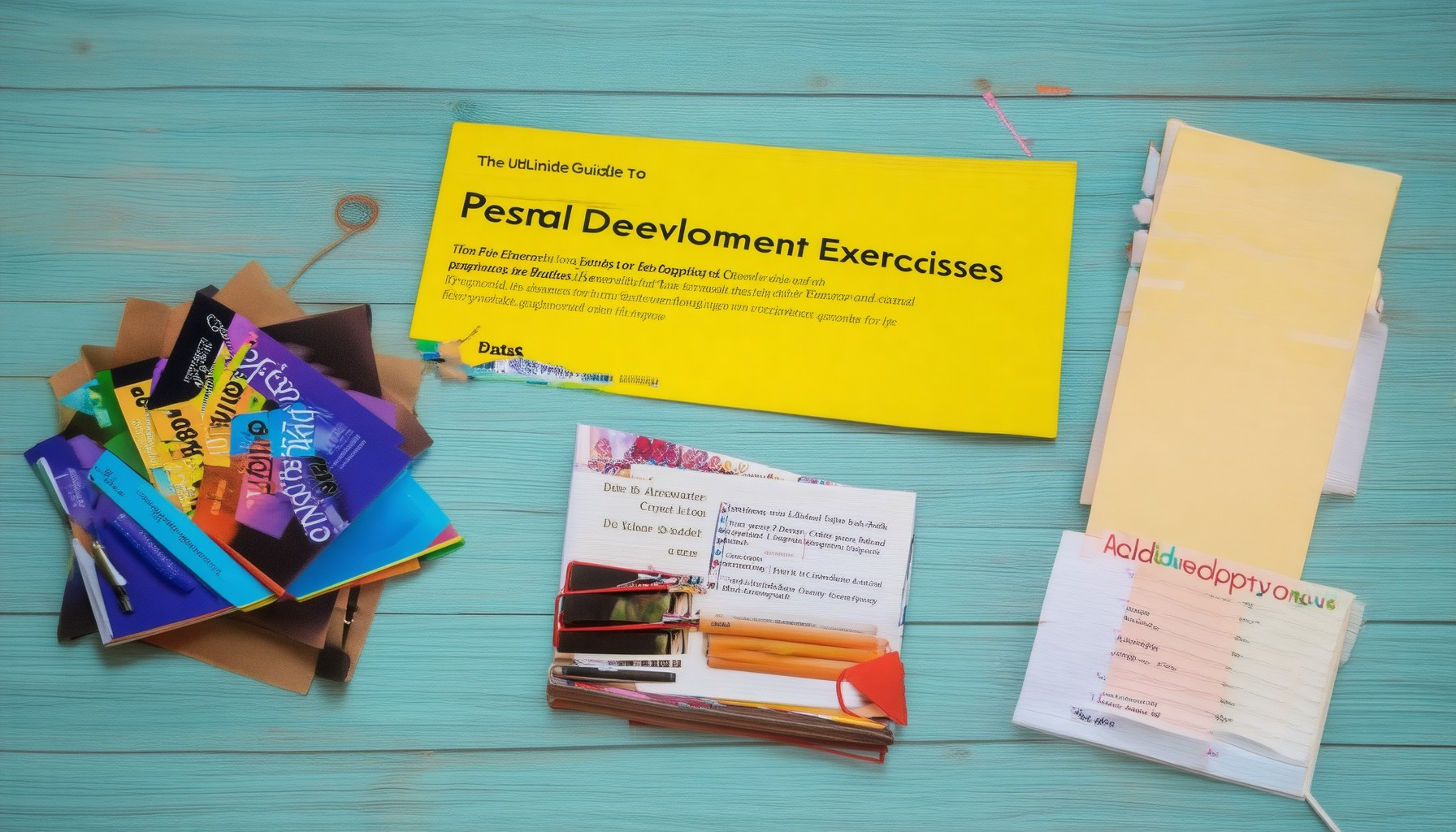Personal development exercises are essential tools for fostering growth, resilience, and self-awareness in individuals across various stages of life. Whether you’re a student aiming to enhance academic performance, a professional seeking career advancement, or someone looking to improve personal well-being, these exercises offer a pathway to unlocking potential and achieving lasting change. From developing critical thinking skills to building strong relationships, personal development activities are versatile and adaptable, catering to the unique needs of different age groups and settings. In this comprehensive guide, we delve into the intricacies of personal development exercises, exploring their benefits, methods, and applications in diverse contexts such as education, workplace dynamics, and personal growth journeys. By equipping yourself with the right knowledge and strategies, you can embark on a transformative journey toward self-discovery and sustained progress.
Key Takeaways
- Developmental Exercises Drive Holistic Growth: Structured activities enhance motor skills, cognitive abilities, social-emotional development, and physical fitness in children, laying the foundation for future success.
- Personal Development Trainings Empower Individuals: These programs focus on self-improvement, career growth, relationship building, and leadership, offering practical, interactive learning for real-world application.
- Seven Key Areas of Development: Personal growth, career advancement, financial management, health and wellness, relationship building, community involvement, and continuous learning create a balanced, fulfilling life through holistic development.
Each bullet captures essential insights, leveraging keywords for SEO while delivering actionable value to readers.
Examples of Personal Development Activities
- 1. Engaging in self-reflection through journaling or meditation.
- 2. Setting personal goals and creating a plan to achieve them.
- 3. Learning new skills or pursuing educational opportunities.
- 4. Practicing mindfulness or stress-reduction techniques.
- 5. Improving physical health through exercise or wellness programs.
- 6. Developing emotional intelligence and managing emotions effectively.
- 7. Enhancing social skills through communication exercises.
- 8. Pursuing career advancement or professional development.
- 9. Managing finances or budgeting for long-term stability.
- 10. Creatively expressing oneself through art or writing.
- 11. Cultivating a mindset of gratitude and positivity.
- 12. Seeking feedback from others to grow and improve.
- 13. Volunteering or contributing to community initiatives.
- 14. Continuous learning and staying updated with trends.
- 15. Practicing problem-solving and critical thinking.
- 16. Building resilience and adaptability to life changes.
- 17. Journaling daily experiences and reflections.
- 18. Practicing effective time management and productivity.
- 19. Exploring hobbies and interests that bring joy and fulfillment.
- 20. Getting adequate sleep and prioritizing rest.
What Are the 5 Key Points of Personal Development?
Personal development encompasses a holistic approach to growing and enhancing yourself in various aspects of life. Here are five essential components of personal development:
- 1. Self-Awareness
- 2. Skill Development
- 3. Mindset Growth
- 4. Relationship Building
- 5. Financial Literacy
Understanding your strengths, weaknesses, values, and goals is the foundation of personal development. Tools like personality tests, EQ assessments, and reflection exercises can help you gain deeper insight into yourself.
Continuous learning and acquiring new skills is vital for growth. Set achievable goals, explore online courses, attend workshops, and engage in hands-on practice to improve your abilities.
Developing a growth mindset allows you to embrace challenges and view failures as stepping stones rather than setbacks. Practice gratitude, stay curious, and surround yourself with inspiring influences.
Strong relationships contribute significantly to personal happiness and success. Work on communication skills, practice empathy, and build a support network to foster meaningful connections.
Mastering financial management is essential for long-term stability and peace of mind. Learn budgeting, investing, and debt management strategies to take control of your financial future.
By focusing on these five key areas, you can create a well-rounded approach to personal development that leads to greater fulfillment and success.
Understanding the 4 Ps of Personal Development
The concept of personal development is often broken down into four key pillars, commonly referred to as the “4 Ps” of personal growth. These pillars guide individuals in achieving self-improvement, building fulfilling relationships, and reaching their full potential. Below is a detailed explanation of each component:
- Purpose : Discovering and aligning your life’s mission and goals. Purpose involves clarifying your “why,” which drives your decisions and actions. It’s about understanding what truly matters to you and living a life that feels meaningful and aligned with your values.
- Passion : Cultivating interests and skills that bring you joy and fulfillment. Passion goes beyond hobbies; it’s about finding work or activities that ignite a fire within you, allowing you to thrive and contribute positively to the world.
- Potential : Unlocking and maximizing your abilities and opportunities. Potential refers to your innate talents and capacities, as well as the possibilities that surround you. It’s about recognizing what you’re capable of and creating environments where you can grow and excel.
- Personal Growth : Continuously learning, evolving, and becoming the best version of yourself. Growth involves acquiring new knowledge, developing healthier habits, and refining your character. It’s the journey of self-awareness and self-improvement that never truly ends.
By focusing on these four pillars, individuals can create a balanced and fulfilling life that aligns with their aspirations and contributes positively to their surroundings. Each element supports the others, creating a holistic approach to personal development that fosters resilience, happiness, and success.
What Are Developmental Exercises?
Developmental exercises are structured activities designed to aid in the growth and development of children, promoting essential skills for movement, coordination, and cognitive abilities. These exercises are tailored to support infants and young children as they explore their environment and develop foundational skills for future growth.
Types of Developmental Exercises
Developmental exercises can be categorized into several key areas, each focusing on different aspects of a child’s development:
- Motor Skills Development: Activities that enhance fine and gross motor skills, such as rolling a ball, sitting up, and crawling.
- Cognitive Development: Exercises that stimulate thinking and problem-solving abilities, like puzzle games or shape matching.
- Social-Emotional Development: Interactions that foster bonding and emotional growth, such as shared playtime or storytime.
- Sensory Development: Experiences that encourage exploration of textures, sounds, and sights, like touching different objects or listening to music.
- Physical Fitness: Movements that promote strength and endurance, such as tummy time or gentle walks.
Importance of Developmental Exercises
Developmental exercises play a crucial role in a child’s early growth. They contribute to healthy physical development, mental stimulation, and social interaction. By engaging in these activities, children learn to move, explore, and interact with their surroundings, laying the groundwork for future learning and development.
How to Implement Developmental Exercises
Parents and caregivers can easily incorporate developmental exercises into daily routines. Here are some simple ideas:
- Encourage rolling a ball back and forth to improve motor skills and coordination.
- Provide age-appropriate toys that challenge cognitive abilities, such as building blocks or stacking cups.
- Read stories or sing nursery rhymes to enhance language skills and emotional connection.
- Offer soft toys or blankets for tactile exploration to support sensory development.
- Take short walks outside to introduce children to new environments and experiences.
By consistently incorporating these exercises, parents can support their child’s holistic development, ensuring they grow into confident, curious individuals.
Resources for Further Exploration
For more information on developmental exercises and child growth, visit Chris and One to discover valuable resources and guides tailored to support your child’s development journey.
What Are Personal Development Trainings?
Personal development trainings are educational programs designed to help individuals grow both personally and professionally. These trainings focus on enhancing various skills, fostering self-awareness, and improving overall well-being. They cater to individuals looking to advance their careers, improve their relationships, or simply become more effective in their daily lives.
Key Areas Covered in Personal Development Trainings
- Self-Improvement :
- Developing self-confidence and self-esteem.
- Learning techniques for stress management and mindfulness.
- Improving habits for better productivity and decision-making.
- Career Growth :
- Mastering essential workplace skills like communication and teamwork.
- Understanding leadership styles and how to inspire others.
- Gaining expertise in niche areas through specialized training modules.
- Relationship Building :
- Enhancing interpersonal skills for stronger connections.
- Learning active listening techniques and emotional intelligence.
- Improving conflict resolution and negotiation abilities.
- Leadership Development :
- Exploring strategies for effective team management.
- Acquiring skills in problem-solving and decision-making.
- Understanding organizational behavior and change management.
Benefits of Participating in Personal Development Trainings
- Skill Enhancement : Tailored programs help individuals acquire in-demand skills.
- Confidence Boost : Workshops often focus on building self-assurance.
- Networking Opportunities : Interacting with peers and experts can open doors to new opportunities.
- Improved Work Performance : Enhanced productivity and efficiency in the workplace.
How Personal Development Trainings Differ from Traditional Education
- Practical Focus : Emphasis on real-world application rather than theoretical knowledge.
- Flexibility : Programs are often modular, allowing participants to choose topics that interest them.
- Interactive Learning : Opportunities for hands-on exercises, group discussions, and feedback sessions.
By investing in personal development trainings, individuals can unlock their full potential and achieve their goals in a structured and supportive environment. These trainings are particularly valuable for professionals aiming to stay competitive in a rapidly evolving world.
7 Areas of Development
The concept of personal and professional development encompasses various aspects that contribute to individual growth and success. Here are seven key areas of development:
- Personal Growth : This involves self-awareness, emotional intelligence, and building self-confidence. It includes practices like journaling, meditation, and setting personal goals.
- Career Advancement : Professional development focuses on skill-building, networking, and advancing in your chosen field. Continuous learning through courses, certifications, and mentorship is crucial.
- Financial Management : Developing healthy financial habits, budgeting, investing, and managing debt effectively contributes significantly to long-term stability and peace of mind.
- Health and Wellness : Prioritizing physical health, mental health, and overall well-being through regular exercise, balanced nutrition, and stress management techniques.
- Relationship Building : Cultivating strong social connections, communication skills, and emotional intelligence to foster meaningful relationships and a supportive social network.
- Community Involvement : Engaging in volunteer work, advocacy, and contributing to societal causes helps individuals feel connected and make a positive impact.
- Continuous Learning : Lifelong learning through reading, attending workshops, and staying updated with new knowledge ensures adaptability and keeps the mind sharp.
By focusing on these seven areas, individuals can create a balanced and fulfilling life that promotes personal and professional growth. Each area intersects with others, forming a holistic approach to development that benefits every aspect of life.









0 Comments